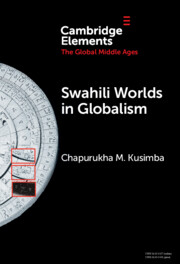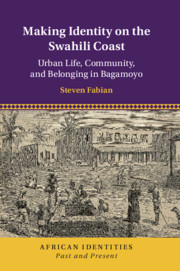Refine search
Actions for selected content:
15 results
From the Time of Ignorance to the Afterlife: Gendered Chronotopes and Religious Nostalgia in Swahili-Language Islamic Marital Booklets
-
- Journal:
- Signs and Society ,
- Published online by Cambridge University Press:
- 18 September 2025, pp. 1-17
-
- Article
-
- You have access
- Open access
- HTML
- Export citation
6 - Forecasting Mistakes in Machine Translation of Environmental Health Information to African Languages
-
- Book:
- Multilingual Environmental Communications
- Published online:
- 16 May 2025
- Print publication:
- 05 June 2025, pp 134-166
-
- Chapter
- Export citation
Poetic Expressions of Night Work in Ja-Mnazi Afrika’s “Riziki”
-
- Journal:
- International Labor and Working-Class History / Volume 107 / April 2025
- Published online by Cambridge University Press:
- 14 March 2025, pp. 115-120
-
- Article
-
- You have access
- Open access
- HTML
- Export citation

Swahili Worlds in Globalism
-
- Published online:
- 31 December 2023
- Print publication:
- 18 January 2024
-
- Element
- Export citation
Lugha ya Dunia - A Language for the World: The Standardization of Swahili By Morgan J. Robinson. Athens, OH: Ohio University Press, 2022. Pp. 270. $80.00, hardcover (ISBN: 9780821424940); $34.95, paperback (ISBN: 9780821424957); ebook (ISBN: 9780821447819).
-
- Journal:
- The Journal of African History / Volume 64 / Issue 2 / July 2023
- Published online by Cambridge University Press:
- 18 July 2023, pp. 308-310
-
- Article
- Export citation
8 - Complex Morphotactic Interactions in Swahili
-
- Book:
- Morphotactics
- Published online:
- 24 November 2022
- Print publication:
- 08 December 2022, pp 224-258
-
- Chapter
- Export citation
12 - Rule‑combining Morphotactics and Morphological Theories
-
- Book:
- Morphotactics
- Published online:
- 24 November 2022
- Print publication:
- 08 December 2022, pp 344-390
-
- Chapter
- Export citation
4 - Competition and Conflict on the Western Frontier
- from Part II - Interactions
-
- Book:
- On the Frontiers of the Indian Ocean World
- Published online:
- 21 July 2022
- Print publication:
- 04 August 2022, pp 121-147
-
- Chapter
- Export citation
7 - Discourse Markers in Language Contact
-
- Book:
- The Rise of Discourse Markers
- Published online:
- 11 June 2021
- Print publication:
- 24 June 2021, pp 211-235
-
- Chapter
- Export citation
2 - The History of Publics in Mombasa
- from Part I - Rethinking Publics from Kenya
-
- Book:
- Searching for a New Kenya
- Published online:
- 18 May 2021
- Print publication:
- 06 May 2021, pp 33-60
-
- Chapter
- Export citation
Introduction
-
- Book:
- Making Identity on the Swahili Coast
- Published online:
- 28 October 2019
- Print publication:
- 07 November 2019, pp 1-30
-
- Chapter
- Export citation

Making Identity on the Swahili Coast
- Urban Life, Community, and Belonging in Bagamoyo
-
- Published online:
- 28 October 2019
- Print publication:
- 07 November 2019
Understanding the layout of early coastal settlement at Unguja Ukuu, Zanzibar
-
- Article
-
- You have access
- HTML
- Export citation
Shifting tactics of intersubjectivity to align indexicalities: A case of joking around in Swahinglish
-
- Journal:
- Language in Society / Volume 36 / Issue 1 / January 2007
- Published online by Cambridge University Press:
- 26 January 2007, pp. 1-24
- Print publication:
- January 2007
-
- Article
- Export citation
